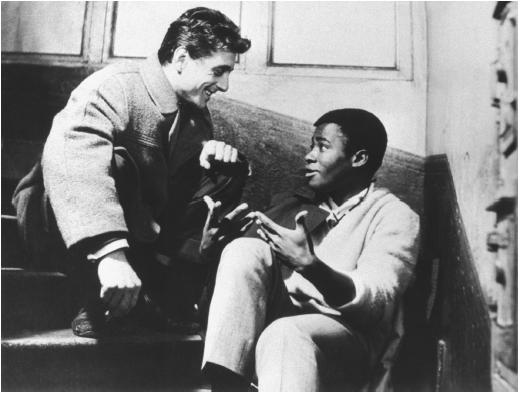Jean Rouch & Edgar Morin - Chronicle of a Summer
Chronicle of a Summer is a film about a summer in Paris and in St. Tropez in 1960. The film follows the lives of several characters and try to tell their stories. All characters have some kind of special aspect; a jewish gilr who survived the holocaust, an immigrant Italian girl, a French labaourer and a black immigrant from French Africa all have fascinating stories about their life expereiences in France and Paris.
Rouch in his films wants to sinthesyze the ideas of Robert Flaherty and Dziga Vertov and hence create a bridge between cinéma-vérité and cinéma-direct. Therefore Chronicle of a Summer is a film that tries to bring in the personal reflexivity of the characters and build on their subjectivities in order to get a sense of the reality of their lives. Hence, the film moves along the fine line between fiction and ethnography that Steven Feld calls 'filmic ethnographic fiction'. From this definition too it is perfectly clear that Rouch is very preoccupied with the problems of subjectivity and reflexivity. In the beginning of the film he and Morin discusses whether it is possible to act natural in front of the camera or not. Thus the film can be considered as an experiment in making a movie about real life by focusing on people reflecting upon themselves and discussing their subjectivities.
Chronicle of a Summer is very different to other ethnographic or sociological films in a sense that Rouch and Morin kind of guide the characters, who are not actors, by giving them current topics that were very prevalent in France in the 60s, and after filming them discussing those topics they make them reflect on their own performances up until that time. As Feld states the film: "...combines the techniques of drama, fiction, provocation, and self-conscious reflexivity and critique that Rouch developed from previous films. In my opinion Rouch managed to create a film that doesn't want to pretend to be completely objective but still present the realities of its characters and the social problems of that time perfectly. I got a very clear feeling about the life in Paris during the 60s and about the sociological and international problems that interested people back then. The ideas of exploitation of the labouring classes, the brutal past that had to be yet faced and the slow collapse of the French colonal empire topped with huge waves of immigrants from ex-colonies in Africa are all incorporated into the film. This gives a great insight into the life back then and into the lives of the characters.
The film is full with constructed scenes, like the scene where the girl who survived the Holocaust walks slowly in Paris telling her and her family's story before and after the 2nd World War, reflecting on her own feelings about the historical events. Based on these parts of the film one could argue that it's not an ethnographic piece of work, I would argue with that. I think this film gives a full and real picture of French society during tat time.
The other very interesting aspect of the movie is the end where Rouch and Morin make the characters reflect upon their performance as if they were actors and actresses. It was very interesting to see what they thought of themselves and each other. They criticise each other when they felt that instead of being truthful one of them was being overly dramatic or played a fake role in certain scenes.
I, for one, felt that the film and the characters were very truthful and showed an objective picture of France in many ways. The participation of the film makers in the film and the discussion about whether someone can act naturally in front of the camera brought the characters even closer to me and their stories became more real.




Nincsenek megjegyzések:
Megjegyzés küldése